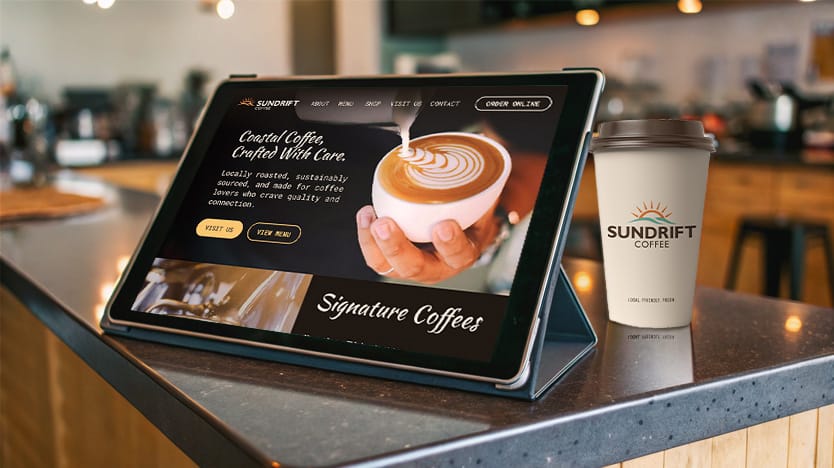9 Questions to Ask Before Hiring a Web Designer (+ Free Questionnaire)
Introduction
If you’re planning to have a new website designed, you’ve probably been wondering, “What questions should I ask before hiring a web designer?”
Anyone who has worked as a web designer or developer will have stories of clients who spent large sums of money on a website that failed to deliver. In most cases, the problem wasn’t the design. The website failed because of unclear expectations and miscommunication.
As a freelance web designer working with small businesses, I’ve seen projects fail due to poor planning and miscommunication more times than I care to remember. That’s why I created this guide of essential questions to ask before hiring a designer, along with the questionnaire I give to clients before a consultation. The combination of these will help you clarify your goals and expectations before you ever meet with a designer so that you can be confident knowing that you’ve selected the right designer for your project.
Your Web Design Planning Questionnaire (PDF)
Whether you are launching your first business website or preparing for a redesign, this web design onboarding questionnaire will help you organize your thoughts, define your goals, and prepare essential assets.
Why These Web Designer Interview Questions Matter
Research indicates that about one in three website projects fail for largely avoidable reasons. While factors such as scope creep and communication breakdowns between business owners and designers can significantly contribute to these failures, the primary cause is often a lack of effective planning. This comprehensive checklist of questions to ask before hiring a web designer includes the most important web design consultation questions to ask during your search, helping you avoid costly mistakes and find the right designer for your project.
Asking the Right Questions Can Save You Time & Money
Hiring a web designer isn’t just about finding someone with an impressive portfolio. You need someone who understands your business, communicates clearly, and follows a process that works for both of you.
Asking web designers the right questions during your interview will help you:
- Save time and money on your project
- Avoid confusion and miscommunication
- Find a designer who shares your vision
- Set realistic expectations from day one
Each question in this “questions for web designers checklist” reveals something important about how the designer works and whether they’re the right fit for your business.
Web Design Consultation Questions: What to Ask Your Designer
#1: What’s Your Design and Development Process?
Understanding a designer’s process and workflow provides a key insight into how they manage their projects. A clearly defined process with different project phases indicates that they are organized and understand the need for creating a well-defined project plan. Do they want to jump right into design, or do they start with a discovery and strategy session? How are feedback and collaboration handled? What is the process for handoff and delivery?
A solid web design process means fewer surprises and better results. Look for designers who can clearly explain their steps.
What to look for:
- Clearly defined beginning and end points for each phase of design
- Open and willing to collaborate on ideas and designs
- Planned opportunities for you to provide iterative feedback
- Regular check-ins and updates
Red flags:
- Answers like “I just like to start designing and see where it goes”
- No mention of strategic planning, collaboration, or feedback
- Unable to clearly define when design ends and development begins
#2: How Do You Stay Current with Design Trends and Technology?
Trends and technologies in web design are constantly changing, and every good designer knows that relevance is the key to avoiding obsolescence.
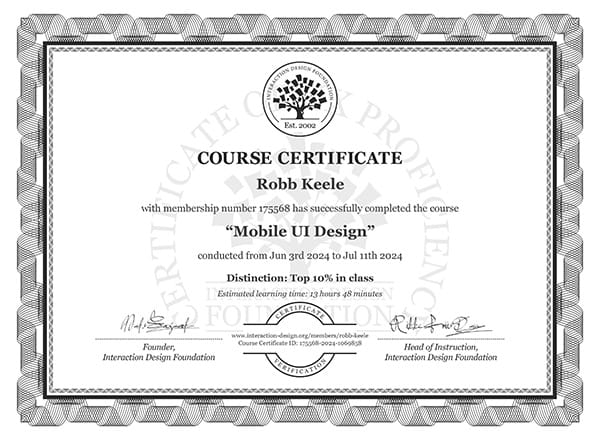
They will stay up-to-date by reading blogs, taking courses, attending meetings or conferences, and experimenting with new tools and techniques that can help them improve their productivity, efficiency, and capabilities.
Learning about how a designer stays current in their craft can reveal whether they’re committed to growing their skills or stuck using outdated methods.
What to look for:
- Excited to share examples of things they’ve learned recently
- Specific names of blogs they follow, courses they’ve taken, etc.
- Knowledgeable of current web standards and best practices
- Genuine interest in staying on top of design trends
Red flags:
- “I’m too busy…” or “I’ve been doing this long enough that…”
- Lack of specificity when asked about current trends
- Portfolio shows only outdated design styles
#3: What Information Do You Need From Me to Get Started?
Organized designers have clear onboarding processes. They’ll ask for specific materials: logo files, brand colors, existing content, competitor examples, and business goals.
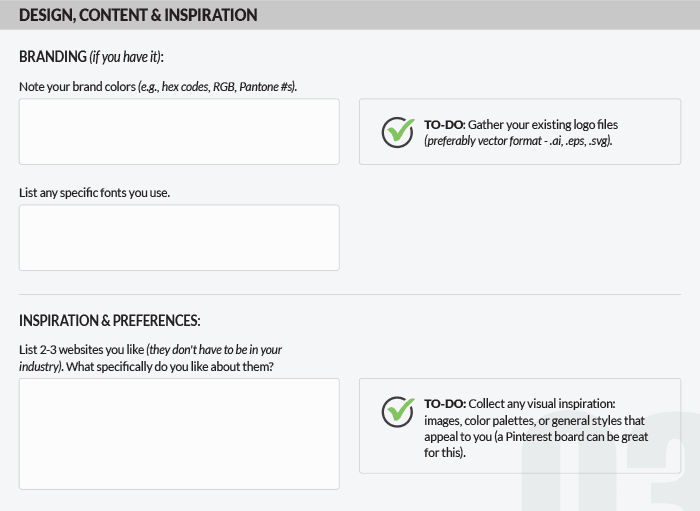
Asking what information they need from you tells you how prepared they are and what you need to gather before the project begins. This is a crucial part of effective website planning.
What to look for:
- A detailed list of required information and materials
- Clear file format specifications for different types of assets
- Timeline for when materials are needed
- Organized onboarding questionnaire or system
Red flags:
- “Just send me whatever you have”
- No clear list of requirements
- No clear timeframe or process for delivering your assets
#4: How Do You Handle Revisions and Feedback?
Every web design project requires adjustments, so it’s wise to bring them up during your consultation. Ask how many revision rounds are included with your project, how feedback is collected, and how long changes usually take to implement.
Understanding how adjustments will affect your project upfront prevents conflicts later when you want to make changes.
What to look for:
- The specific number of revisions included with each phase of design
- A clear process for collecting feedback
- Reasonable turnaround times for any changes that you make
- A policy for making additional revisions beyond the included amount
Red flags:
- No revisions allowed, or no revision policy mentioned
- Unlimited revisions (which often leads to scope creep)
- Lacking a structured process for collecting feedback
#5: What’s a Realistic Timeline for a Project Like Mine?
You can help avoid unexpected delays to your project by understanding the anticipated timeline. Professional designers will give realistic time estimates and explain factors that might cause delays. Be cautious of designers who promise unrealistic turnaround times without understanding the full scope of your project.
Any designer promising a custom site in one week is likely cutting corners.
What to look for:
- A project timeline that’s broken into specific phases
- Buffer time for revisions and feedback
- A clear explanation of what affects timing and delays
- Realistic expectations based on the project complexity
Red flags:
- Promising quicker than usual delivery without discussing details
- Not mentioning revisions when discussing the project timeline
- A project timeline that seems too good to be true
#6: What Support Do You Provide After Launch?
Some designers will quickly move on after your site goes live, leaving you responsible for handling any bugs or issues that may arise. Others offer ongoing support, training, and maintenance options.
Gaining an understanding of how your web designer handles post-launch support will help you plan for the future so you avoid being left with a website you can’t update.
What to look for:
- Designer-led walkthroughs introducing you to basic features
- Training or documentation designed to help you update your site
- Post-launch support and/or ongoing maintenance options
Red flags:
- “Once the site is live, you’re on your own.”
- No mention of post-launch support or maintenance
- Unclear support policies that leave you guessing
#7: How Will You Ensure My Website Performs Well?
A high-performing website should load quickly, work well on mobile devices, and adhere to best practices for search engines and accessibility. Ask how your designer plans to handle your website’s performance and basic SEO (Search Engine Optimization).
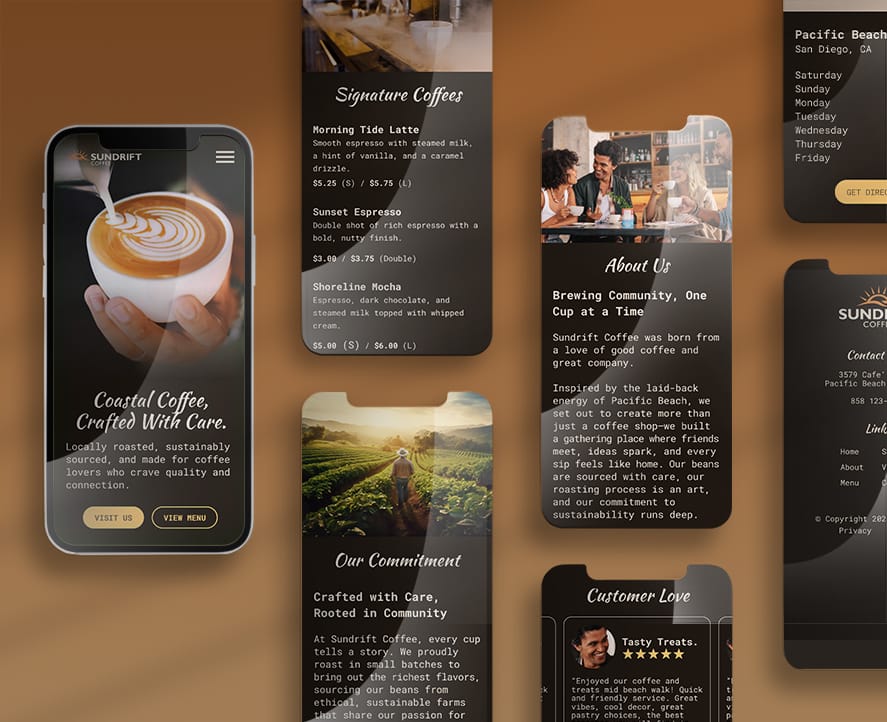
What to look for:
- Mentioning mobile-first or responsive website design
- Discussing plans for managing site speed and/or performance
- Discusses strategies for handling basic SEO implementation
- Performs cross-browser compatibility testing
Red flags:
- “Everything we do is mobile-ready (or responsive) out of the box”
- No mention of mobile optimization or browser testing
- Claims that SEO isn’t needed anymore because “content is King”, AI, etc.
#8: What Exactly Is Included in Your Quote?
The exact details included in web design quotes can vary significantly, so be sure you understand what you’re getting by asking for specifics. Does the quote include content setup, basic SEO, or hosting guidance? Are any other services included? If so, what are they? Who will own the domain name and hosting when you’re done (hint: it should be you)?
What to look for:
- A detailed breakdown of the deliverables for your project
- A clear explanation of what’s not included within your project scope
- Transparent pricing with no hidden fees or detailed fine print
- Clear and reasonable payment schedule and terms
- A transparent explanation of domain name and hosting ownership
Red flags:
- Simple quotes with unclear deliverables or scope
- Prices that seem too low or are missing key components
- Reluctance to put the project scope or quote in writing
- Maintaining ownership of domain names and/or website hosting
#9: How Do You Learn About My Business and Audience?
Effective web design isn’t one-size-fits-all. Ask how they discover your brand personality, target audience, and business goals before starting design work. This is where proper web designer selection becomes crucial for small business website design success.
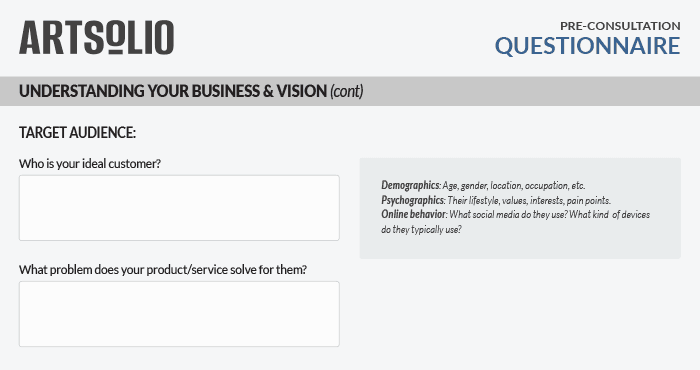
What to look for:
- Discovery calls or strategy sessions
- Questions about your target audience
- Interest in your business goals and challenges
- Research into your industry or competitors
Red flags:
- Jumping straight into design without discovery
- No questions about your business or customers
- Generic approach that could work for any business
Web Designer Interview Questions for Better Hiring Decisions: Top Red Flags to Watch For
During your web design consultation, watch for these common warning signs:
- No written contract or clear scope of work
- Unrealistic promises or timelines
- Poor communication or slow response times
- Reluctance to explain their process clearly
- Disorganized onboarding or unclear next steps
- Prices significantly below or above market rates without explanation
- Insists on maintaining ownership of your domain name or hosting
How to Use These Questions in a Web Design Consultation
During your consultation:
- Ask your web designer these questions in your first meeting or discovery call
- Take notes and compare responses from different designers
- Pay attention to how clearly they communicate
- Trust your instincts about their professionalism and organization
After the consultation:
- Review your notes and compare different designers
- Check that all your questions were answered satisfactorily
- Consider both their expertise and how well you communicate together
- Make sure their process aligns with your working style and timeline
Frequently Asked Questions
What should a web designer provide me with after the project?
You should receive all design files, website login credentials, documentation on how to update content, and any training needed to manage your site. Some designers also provide a brief maintenance guide.
Who should handle the domain name registration and hosting?
Your designer should be able to offer guidance if you need assistance with registering a domain name or securing a hosting provider. However, if you didn’t register your domain name or set-up the hosting yourself, your designer should provide you with administrative credentials and full control. Designers and agencies that insist on retaining ownership of either or both retain full control of your website and should be avoided.
How many revisions should be included in a web design project?
Web design revisions will vary by designer and project complexity and should be clarified in your contract. All of my web design services and packages include a set number of revisions and ample opportunity for feedback.
Most designers include 2-3 rounds of revisions in their base price. A typical contract might include one revision to the initial design of your website, a revision after development, and one final round for minor content tweaks and adjustments.
What happens if I need changes after my website launches?
This depends on the terms established by your design contract. All of my web design services include a 14-day bug-fix warranty. I also offer an ongoing maintenance package that provides for minor updates and regular maintenance to keep your site running smoothly.
Some designers may offer similar services, while others may charge hourly rates for post-launch changes. Always clarify this before starting a design project.
Should I provide content for my website, or will the designer create it?
Most web designers expect you to provide your own content (text, images, etc.). Some offer content creation services for an additional fee. Others may put you in touch with a copywriter or photographer to help you develop the content you need. Clarify this with your designer early in your discussion.
I offer content creation and sourcing assistance services designed to provide small business owners with a strong content foundation to build upon.
Are You Ready to Meet with a Web Designer?
Schedule a free 30-minute consultation, and I’ll help you create a website project brief that makes sense for where you’re at now, and where you want to go.
Just want to ask a question about design planning? Contact me

